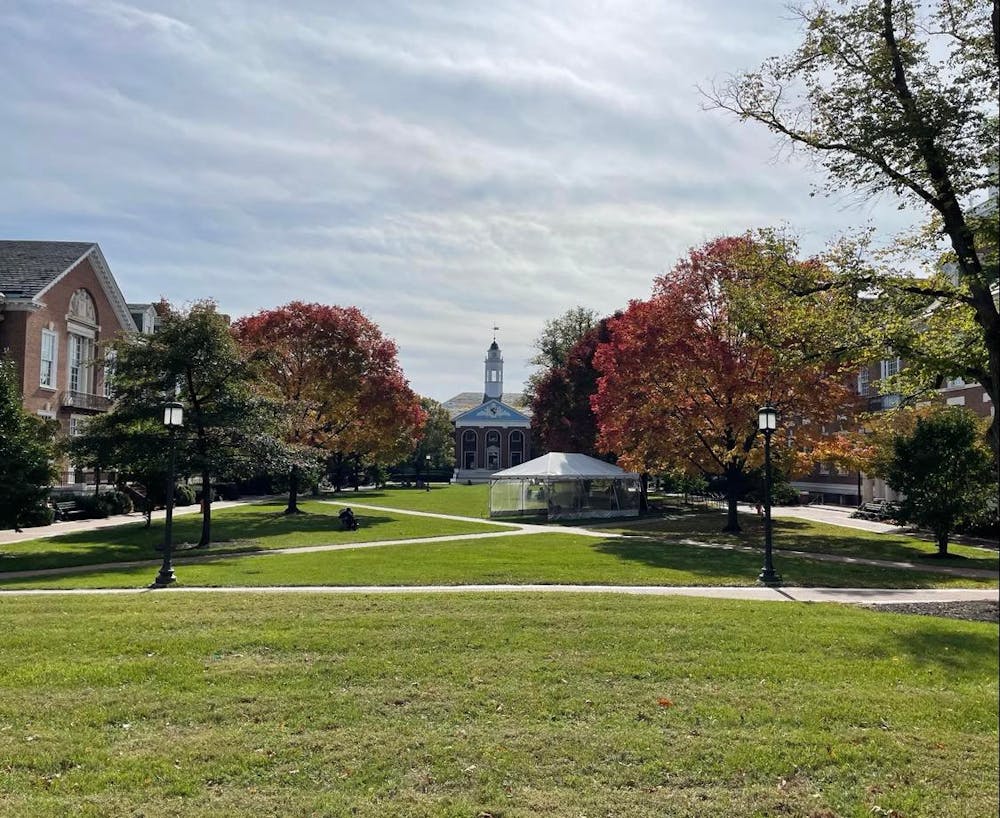Members of the Sustainability Leadership Council held a town hall with Provost Sunil Kumar and Senior Vice President for Finance and Administration Laurent Heller on Dec. 2 to discuss the drafting of the University's sustainability plan, which will establish goals and initiatives through 2030. The initial vision of the plan is focused on reducing greenhouse gas emissions, setting guidelines for building, and other priorities.
Guest speaker and Hopkins alum Dr. Jonathan Patz, the director of the University of Wisconsin-Madison Global Health Institute, joined the administrators at the event. Patz co-chaired the health report for the first congressionally mandated U.S. National Climate Assessment. For 15 years, he served as a lead author for the United Nations Intergovernmental Panel on Climate Change, which shared the Nobel Peace Prize in 2007.
Patz opened the town hall with a conversation on how climate change needs to be addressed immediately. He outlined several venues for addressing climate change, including the transportation sector and green travel, decarbonization of the health-care system and what Universities can do.
“Universities inspire and train the next leaders. Number one should be to absolutely embed this throughout the curriculum and through engagement with partners,“ he said. “Climate change is and should be an apolitical issue. It’s about facts and science and simply you as a University; we are to promote science and train the next generation.”
Janika McFeely, a senior sustainability consultant at Integral Group, a deep green engineering and consulting firm, spoke about her role as an advisor to the University's Sustainability Plan.
“The goal here is to create an updated framework for the next eight years, going towards 2030,” she said. “We need to set the stage for milestones that will require a longer time horizon, such as the carbon neutrality goal or some additional carbon climate action goal that may have a longer roadmap.”
McFeely emphasized the importance of engaging all members of the Hopkins community, from staff and students to community partners and the local Baltimore community.
“Our biggest focus is on stakeholder engagement so this is a co-created plan,“ she said. “This is not us as consultants coming in and saying, ‘This is what you have to do.’ This is not the Office of Sustainability creating it on their own. This is really a consensus-based vision framework and roadmap.”
McFeely spoke about the measures the council has been taking in order to be transparent and responsive to community feedback, including stakeholder meetings and a survey that is being distributed to collect opinions to inform the upcoming draft, which will be finalized around April 2022.
Office of Sustainability Director Julian Goresko explained how community engagement and environmental justice were two important factors in informing the community about the climate change plan.
“Environmental justice is an issue within our Johns Hopkins community. It's true with our surrounding communities; it's also true and how the University can positively, perhaps negatively, impact environmental justice globally through our research and through our broader activities,“ he said. “We need to think about this across scales. There's particular urgency for those of us here in Baltimore because of the salience of environmental justice and historical and present environmental injustice in our city.”
Megan Latshaw, associate scientist in environmental health and engineering at the School of Public Health, discussed how this plan will include Hopkins campuses inside and outside of Baltimore.
“We often think about Baltimore, because a lot of our campuses are in Baltimore, but we also have campuses in other parts of the country that will also be part of this sustainability plan,” Latshaw said. “We're also thinking about ways to engage the broader community there as well.”
Jonathan Pruitt, a public health master’s student, wrote in an email to The News-Letter that he felt the event was a step towards transparency and that he hopes more attention is paid to environmental racism and the intersections with public health.
He wrote about important next steps the University should take to incorporate community feedback and be accountable to the broader community.
“I appreciated the steps the University is taking toward the many committees they have on this spanning from different perspectives and backgrounds,” he wrote. “I'd love to see if there's a way for some community benefits agreement where the community has some ownership to it as well. This Sustainability Plan has the potential to be holistic in a way where everyone has ownership of it. The community engagement piece is what I'm watching for.”





